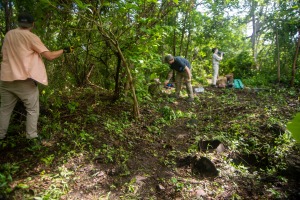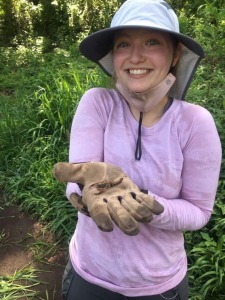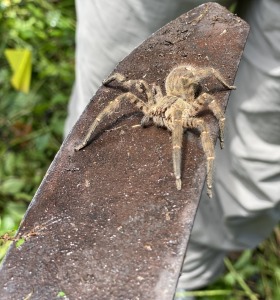By Andrew Califf

Students clear foliage around exposed burial urns at El Rayo’s Locus 3 to further excavate the cemetery. One of Geoffrey McCafferty’s goals for this field season is finding this cemetery’s boundaries.
In the green inferno of dripping humidity, the Salablancas’ banana field will eventually be home to the standard, square-meter excavation trenches commonly set up at archeological digs, but a few things need to happen first.
Large plantain leaves hang down and hammer students as they clear six-year-old growth at Locus Two. Angry ants swarm up and under sweat- and dew-drenched pant cuffs, spiders fall from cut foliage onto shoulders, and scorpions scuttle under the sliced floral remains.
Since archaeology is an academic field that largely involves working outdoors in some extremely harsh places, environmental factors drastically impact the execution of archeological procedures. The impact of natural forces cause a wide range of different experiences in the field, for which a course in a typical classroom setting may not offer sufficient preparation.

Anna with her guardian amigo.
Stomping scorpions, slashing trees with a machete, and heat rashes are not usually part of the curriculum for anthropology classes at universities. Sharisse McCafferty tells of how her son went to excavate in Spain and showed up with an extremely small trowel. He wasn’t prepared for the rocky soil.
“My trowel had a baby and that is your trowel,” she explains with a chuckle. “In Calgary, they have what we call the ‘kitty litter’ project. Students are literally given a kitty litter box and that is their practice. And then they come down here and they have no idea what they are going to do. It’s nothing like the kitty litter box.”
Many embrace the challenges of the field and persevere to accomplish the work, if not fully enjoying the challenges.
“They told me that if you put scorpions in your pocket, it will bring you luck,” Anna Brown, a Colgate graduate, explains after holding a stinger-less scorpion. “I held my little amigo for a few minutes before saying goodbye and returning him to his home. I’d like to think he’ll protect me from other bugs in the field.”

A tarantula found on the first day while clearing the previously excavated Locus 2, which is located right near the dirt road entrance to the Slablanca’s property.
Our work from start to finish goes from the field to the sterile lab, which lacks fluffy, stinging caterpillars. This transition is a lot in itself.
Archeology is a field in which difficulties vary as much as individual stories from the field. For many, they have to ask: Is the reward worth the sweat, rashes, bites and stings? These difficulties transcend the common expectations of field work. There are no boulders and crazy Nazis, but all of the snakes and insects Harrison Ford faces are a true reality of field work.

